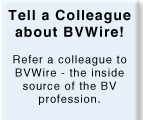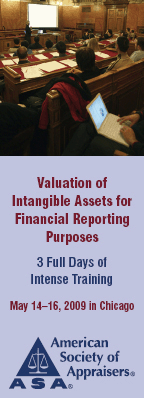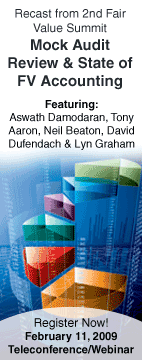
| SEC resists ‘bright line rule’ on control premiums—but still wants to see adequate support from appraisers The staff of the Securities Exchange Commission (SEC) acknowledges that the determination of control premiums “is an area that does require a substantial amount of judgment,” Evan Sussholz, Professional Accounting Fellow—Valuation Specialist Office of the Chief Accountant Securities and Exchange Commission, told the 200-plus attendees at BVR’s Second Annual Fair Value Summit held in New York City this week. However, “contrary to what people might believe, the SEC does not have a bright line rule” regarding the application of control premium in any specific valuation determination, Sussholz said. It also recognizes that their application “can vary widely according to a particular industry, economic sector, etc.” At the same time, Sussholz—who spoke at the conference’s FASB/SEC/PCAOB joint session— warned that if an appraiser uses a control premium that falls outside of what has been seen in prior transactions or industry standards, “we would expect more analysis of cash flows, benefits of control, market participant analysis,” he said, “and not simply ‘let’s just look at a broad brush average of transactions.’” (Sussholz’s comments are, of course, his personal opinions and not those of the SEC.) What happens to control premiums in a distressed market? “The control premium is a traditional term used in the valuation profession,” said Ernst & Young’s Tony Aaron, who spoke on the Summit’s “Big Four” panel. Recent research shows that in distressed markets, control premiums would appear to expand, Aaron added, just as they contract during good economic times. However, is control really the concept captured in the number? Or does it reflect the difference between two markets—the private, M&A market and the public securities market? “Those expansions and contractions may have more to do with what’s happening in those two markets than the control premium per se,” Aaron said. The traditional term may need a name change—but no matter the moniker, these experts agree that any premium that departs from prior standards requires adequate analysis and support. Valuators can play vital role in improving fair value process and practices In his address to Summit attendees, the SEC’s Sussholz emphasized the expanding role that business appraisers and valuation specialists can take during the current economic crisis, particularly in the wake of the Commission’s just-released Study on Mark-to-Market Accounting and its recommendations not to suspend FAS 157’s fair value measurements and mark-to-market accounting standards (See BVWire™ #76-1.) Appraisers can help with best practices standards, he said, especially in the areas of appraising inactive assets and incorporating liquidity and credit risks into valuations. Indeed, according to Sussholz, “Valuation specialists and appraisal associations can play a vital role in developing best practice documents, reducing diversity in practice, and ensuring that guidance is disseminated more broadly among the financial reporting community.” In addition, although the Financial Accounting Standards Board (FASB) is ultimately responsible for determining the role of its Valuation Resource Group (VRG), appraisers can help make FASB's standard setting process more public, Sussholz said, and they can “help get the necessary information and guidance out to a broader community.” “The FASB is definitely listening to the input of the valuation community as it applies to fair value for financial reporting,” confirmed Kristofer Anderson, a FASB Valuation Fellow who also spoke at the Summit. A possible starting point: tune into the VRG’s public broadcasts. For more information, visit the FASB Web site. Recast allows a 'second opportunity' for BV experts to glean information and insights from the 2nd Annual Fair Value Summit Fear not if you were unable to attend BVR’s Second Annual Fair Value Summit held in New York City this week. Yes, those not in attendance missed a range of educational presentations by top BV experts, networking opportunities, and more, but you can still “tune in” to catch two highlights from this well-attended (and well-received) event. Two hands-down highlights from the meeting—which offered a range of great speakers and presentations—included a session where Neil Beaton, David Dufendach, Tony Aaron, and Lyn Graham exchanged roles and treated attendees to an educational improvisation of a mock fair value audit review and Aswath Damodaran’s rousing (and controversial) discussion on the state of fair value accounting. The good news: In a special presentation, BVR, in conjunction with the National Association of Certified Valuation Analysts (NACVA), will recast these two outstanding sessions with streaming video between the hours of 6:00am-11:00am (PT) or 9:00am-2:00pm ET on February 11, 2009. You can also call in for the Q&A session with Aaron from 11:30am-12:30pm (PT) or 2:30pm -3:30pm (ET) on February 11, 2009. Note: The Q&A session is required to earn CPE credits. Additional information on this outstanding recast in available online. Advice to BV experts/attorneys: Time to get ready for the ‘information explosion’ The amount of electronic information that our technology can now produce is “virtually unlimited,” Tom Hilton with the Anders Minkler & Diehl accounting firm in St. Louis, Missouri, told attendees at a recent industry meeting in Vail, Colorado. Since the amendments to the Federal Rules of Civil Procedure to govern the production and preservation of electronically stored evidence (ESI) (see BVWire™ # 64-1), both the legal and valuation professions are “morphing” to handle the explosion of ESI, Hilton said. In particular, the “98% Rule” now indicates that in any legal matter, “you can assume that 98% of the information you’re going to see is electronic.” Discovery today means electronic discovery, and trial litigators have become, largely “discovery litigators and negotiators,” Hilton told attendees. Already a new trend of “national e-discovery counsel” is appearing on the legal landscape. “National law firms and corporations hire counsel who are adept at ESI discovery and who have worked with IT professionals in complying with the federal rules,” Hilton explained. One such professional may supervise the e-discovery process, and then an entirely different person may take over when the case goes to deposition and/or trial. An entire “cottage industry” of IT professionals is “burgeoning” to assist forensic accounting experts in the production and preservation of ESI in litigation disputes, he told attendees. The authors of the recent article, “Information Inflation: Can the Legal System Adapt?” (13 Richmond Journal of Law & Technology, Spring 2007), make a very good case that the legal profession and its related community of forensic and litigation experts are not prepared for the “out of control volume of information that is generated today,” Hilton said. In the legal profession, time and cost are the major impact-factors. For the financial expert, the fundamental hurdles are the reliability and authenticity of the information that forms the basis of their opinions, and “for us, authenticity is our credibility,” Hilton said. He cited the recent “seminal” case, Lorraine v. Markel American Insurance Co. (2007), in which the U.S. District Court warned:
Another must read for attorneys and litigations experts: Last March, the Sedona Conference published its Commentary on ESI Evidence and Admissibility, which illustrates the authentication process for various types of ESI under the federal rules (emails, chat room discussions, etc.), and also provides checklists, decision trees, and practice tips. “Litigation is now all about information and how we can demonstrate that the information is what it purports to be,” Hilton said. For a complete discussion of how the information explosion is impacting the legal and BV professions, the consequence of the Lorraine case “raising the bar” and the emerging responses from the American Bar Association and other professional resources, look for our coverage of Hilton’s presentation in the February 2009 issue of Business Valuation Update™. In the news: Barbo named director in Deloitte’s BV practice Deloitte Financial Advisory Services LLP is expanding its business valuation practice by naming Don Barbo a director in Dallas. During his 22-year career, Barbo—a frequent speaker on healthcare valuations and contributor to BVR’s Guide to Healthcare Valuation—specialized in business valuations, specifically dealing with healthcare valuation engagements involving mergers and acquisitions, divestitures, partnership transactions, leasing arrangements, divorces and commercial damages. Prior to joining Deloitte, Barbo served as the Director of Healthcare Valuations Services for Hill Schwartz Spilker Keller LLC, a valuation and litigation-consulting firm. We wish Don the best of luck in his new endeavors!
|
To ensure this email is delivered to your inbox,
please add editor@bvwire.com to your e-mail address book.
We respect your online time and privacy and pledge not to abuse this medium. To unsubscribe to BVWire™ reply to this e-mail with 'REMOVE BVWire' in the subject line or click here.
Copyright © 2009 by Business Valuation Resources, LLC
BVWire™ (ISSN 1933-9364) is published weekly by Business Valuation Resources, LLC
Editorial Staff | Advertise in the BVWire | Copyright Notice
|


